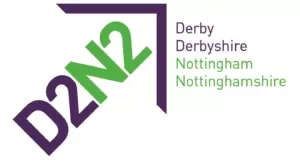Free Grant Funded Digital Skills
Bootcamps in Nottinghamshire & Derbyshire
14-week Skills Bootcamp in Digital Marketing in Nottinghamshire and Derbyshire
Free for job-seekers & self-employed (employers pay 10-30%)
Grant-funded digital skills bootcamp – Apply Now for learners based in Nottinghamshire and Derbyshire
We are now recruiting for a limited number of places for learners in the Norfolk and Suffolk region. Complete the application form now or read on for further details.
Read on to find out more about the course itself, leading to a Level 5 qualification from the Digital Marketing Institute (DMI).
So far, we have run 29 courses in the East Midlands and East Anglia, training over 1000 learners, since January 2022.
Anicca can offer this grant-funded course because we are one of the training providers approved by D2N2 to deliver their digital skills bootcamps.
The funding is from the Department of Education (DfE); as part of the Lifetime Skills Guarantee and Plan for Jobs.
It doesn’t matter what level of knowledge you have. Our course will take you through the basics all the way to advanced digital strategy. This digital marketing course is suited to anyone looking for a qualification in Digital Marketing.
Grants and funding
If you are employed, you can take the course through your employer. However, if you are self-employed, unemployed, or a recent student, you can sign up for the course yourself, as an individual learner.
The course is free for individual learners, whereas employers, will be required to make a contribution of 10% – 30% depending on the size of the company (see below):
- SMEs (businesses with less than 250 employees) only pay 10% contribution (£275 +VAT)
- Businesses larger than 250 employees pay 30% contribution (£825 +VAT).
Format of the course
The course consists of a minimum of 60 hours of guided learning. The course is taught over 14-weeks.
Each week you will receive a live lesson, plus self-service webinars and access to other Anicca resources.
Working with employers
We want to hear from any employers that have staff that would benefit from the course, or that may be interested in offering our learners a job interview or career opportunity.
You can find out more about our free trainee placement and recruitment service by clicking on the link.
The details of what you will get from this course are outlined below:
- Live training sessions, led by our agency experts. More than 10 lessons over 14 weeks of practical training .
- The classes are taught live, by our agency staff and are simultaneously streamed online.
- The video recordings can also be watched later, for example, at weekends and in the evenings. However, you must have watched the recording within 1 week of the live sessions, to continue on the programme.
- Additional webinars, online lessons, and other resources will be provided; including a choice of 6 practical half-day workshops on subjects like GA4 and ChatGPT.
- Ongoing communication and support (via WhatsApp), enabling communications with other learners and your trainers.
- Once you have completed the 10 days of lessons, you will be given 1 day of guided revision and self-study for the DMI level 5 qualification. This is an independently verified multi-choice exam that you take online.
- If you complete the course and provide the first lot of “evidence of positive outcomes”, you will get a certificate of attendance, plus 6 months membership to the DMI, access to their free resources, and a free exam voucher to take your exam.
- You can attend various workshops from local Universities and colleges on education and apprenticeship opportunities.
- Practical “Recruitment-ready workshops” are offered to help you develop CV and interview techniques.
- Our team will help individual learners to get ready to apply for jobs with CV and interview preparation and she will proactively look for jobs for you.
- You are GUARANTEED AN INTERVIEW for a job or apprenticeship, as part of this programme. This is particularly useful for learners that are unemployed, recent graduates, or working part-time and want to switch careers.
- Option to take additional exams like the Google Analytics or Google Ads certifications.
The details of what you will get from this course are outlined below:
Our established Anicca Digital Skills Bootcamp is the only digital marketing qualification delivered by practising agency professionals. It is a premium programme designed to give learners the theoretical and practical skills required to set up and manage in-house digital marketing campaigns.
With 18 years of experience as a digital agency, Anicca Digital has delivered award-winning campaigns and DMI courses for leading brands across the UK.
The new training programme combines theory and practical tips across the following topics:
- Social Media
- SEO and Content Marketing
- Paid Media and Digital Advertising
- Measurement and Analytics
- Email Marketing
- Video and Display
- Web Optimisation
- Developing Your Marketing Strategy
This will be supported by an online learning centre with over 300 PowerPoint slides, student handbooks, videos and around 80 practical activities. This allows personal study at home in preparation for each module.
More details of each course module can be found below.
When studying for the DMI exam, our team is on hand to support your development with resources, advice, and practical exercises.
The certifications and exams
- You will receive a certificate of attendance, once we have verified you have attended or watched all the 60 guided learning hours and evidence of a job interview or career progression.
- You will then study and book your DMI exam. This course is “The Certified Digital Marketing Professional” and if you pass the multi-choice online exam you will be qualified with a Level 5 Scottish Qualifications Authority (SQA) accredited qualification.
Guaranteed Interview for unemployed learners
Our team, will work with you to help you with CV preparation and understand your career aspirations. We then identify and post jobs on our Slack group on a daily basis, and act as a match-maker service with local employers to ensure that all unemployed learners get a guaranteed interview.
Practical and theoretical training
The DMI course marries theory and practical skills to provide with a solid base from which to build your career. This distance learning version of the DMI course would typically cost over £2,000.
Learn from industry experts
Students also learn the intangibles from industry experts who provide tips on soft skills and personal experiences to better understand the demands of the industry
Supported learning
We support students with a plethora of slides, exercises, videos, and activities to support development and self-study. We also have a Slack community where we answer all your questions.
Professional qualifications
The DMI course is a professional qualification that not only strengthens your CV but opens the door to a range of qualifications
Course content & DMI modules
How much does the course cost and how do I apply?
Grants and funding
Here is a breakdown of the costs for different types of learners:
a) Learners looking for a job or an apprenticeship – Free place
This includes the following groups:
- Unemployed
- Recent graduates
- Lost employment / income / education due to COVID-19.
- Want to return to work following redundancy, health issues, childcare etc
b) Self-employed learners or sole traders – Free place
These groups can join the programme for FREE, as they will receive 100% grant funding for the course and the cost of the DMI exam.
c) Learners who are currently employed
For the current project, employees will need to get permission from their employer, as their company will be required to make a contribution to the cost of the course.
d) Employers that want to train their existing staff
Employers will receive up to a 90% grant towards the cost of the course and the DMI exam.
- SMEs businesses with less than 250 employees – only pay 10% contribution (£250 +VAT)
- Businesses larger than 250 employees pay 30% contribution (£750 +VAT)
- Amounts vary depending on your location and whether your staff take the DMI exam.
How to apply?
Our next course, for learners based in Nottinghamshire & Derbyshire will start Summer 2025.
Places are limited, so we need to ensure that you are eligible and that you have the necessary time and commitment to complete the programme. You will need to sign a contract to confirm that you understand your commitment.
So, if you are looking to get grant-funded digital marketing training for yourself or your employees; then you will need to:
- Complete the application form
- If you are based in Nottinghamshire or Derbyshire then click on this link
- or email one of our team at [email protected].
- or call Lucy Hammond, on 0116 254 7224, if you have any questions, or if you would like to check your eligibility over the phone.
- You can also download our Digital bootcamp induction for learners
Note: We are hoping to run further courses for other regions in 2025
Partners & Awards
Funding & Partners
Awards








